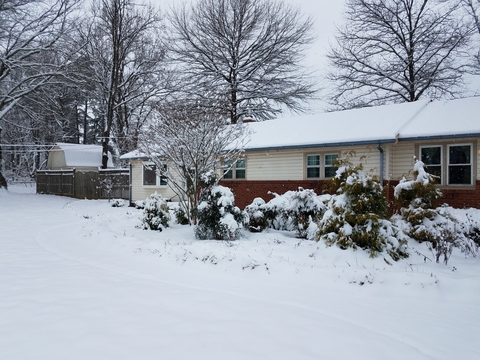Roofing insulation plays a pivotal role in home upkeep, particularly in regions experiencing severe winter climates, such as Pennsylvania. This vital component serves to stabilize indoor temperatures, decrease energy usage, and safeguard the home’s structural integrity. In this detailed examination, we explore a range of roofing insulation strategies that are particularly beneficial for the challenging winters in Pennsylvania. We will discuss the advantages of each method and provide insights on their efficient application.

Grasping the Climate Dynamics of Pennsylvania
The winter season in Pennsylvania is characterized by frigid conditions, often accompanied by snowfall and temperatures frequently plunging below the freezing point. Such a climate necessitates the implementation of sturdy insulation techniques. These are crucial not only for maintaining a warm and comfortable living environment but also for curtailing heat escape. By optimizing insulation, homeowners can significantly alleviate the strain on their heating systems, resulting in lower energy expenditures. This exploration will delve into how different insulation options can be tailored to meet the specific demands posed by Pennsylvania’s winter climate, ensuring homes are cozy, energy-efficient, and well-protected against the elements.
Importance of Proper Roofing Insulation
- Energy Efficiency: High-quality roofing insulation plays a crucial role in retaining heat within the home, thereby substantially reducing the necessity for constant and extensive heating. This is particularly vital in colder climates, where maintaining a warm indoor environment can be challenging. By keeping the warmth inside, insulation ensures that heating systems operate more efficiently, leading to significant energy savings and a reduction in utility bills.
- Moisture Control: A key function of proper roofing insulation is its ability to mitigate moisture accumulation, a common issue in cold and snowy regions. Insulation effectively prevents the formation of ice dams on the roof, a scenario where melted snow refreezes at the roof’s edge, causing water to back up under the shingles and potentially leading to moisture intrusion. By maintaining a consistent temperature across the roof, insulation reduces the chances of these ice dams forming, thereby safeguarding the home against water damage and related moisture issues.
- Longevity of Roof: The lifespan of a roof can be considerably extended through adequate insulation. Inadequate insulation often leads to the formation of ice dams and an increase in condensation, which can cause damage to the roof structure over time. By preventing these issues, proper insulation not only maintains the integrity of the roof but also avoids costly repairs and replacements. A well-insulated roof is less susceptible to the wear and tear caused by extreme weather conditions, thus ensuring a longer service life and maintaining the home’s overall structural health.
Top Roofing Insulation Techniques for Pennsylvania Winters
- Fiberglass Batt Insulation:
- Description: Fiberglass batts are flexible blankets of insulation, typically installed between the rafters or studs in the attic.
- Benefits: They are relatively inexpensive and easy to install. They provide a decent R-value (a measure of thermal resistance) per inch.
- Spray Foam Insulation:
- Description: Spray foam is applied as a liquid, expanding and hardening into a solid foam layer. It can be used in attics and directly under the roof.
- Benefits: It offers high R-value, seals air leaks, and is resistant to moisture. It’s particularly effective in preventing heat loss through the roof.
- Rigid Foam Insulation:
- Description: Rigid foam boards can be installed under the roof sheathing or inside the attic.
- Benefits: They provide a high R-value and are excellent for blocking thermal bridging through the roof framing.
- Loose-Fill Insulation:
- Description: Materials like cellulose, fiberglass, or mineral wool are blown into the attic space.
- Benefits: This method is great for filling in irregular spaces and around obstructions, offering a comprehensive coverage.
- Reflective Insulation:
- Description: Reflective insulation, like foil-faced kraft paper, plastic film, or polyethylene bubbles, reflects heat away from the living space.
- Benefits: This is particularly effective in summer but also helps in reducing heat loss in the winter.
Implementation Tips
- Professional Assessment: Always start with a professional assessment of your current insulation and roofing system.
- Consider R-Value Needs: Different areas in Pennsylvania might require different R-values. Consult local building codes and insulation guidelines.
- Airtight Sealing: Ensure that any gaps or leaks in the roof are sealed to maximize the effectiveness of the insulation.
- Ventilation: Proper attic ventilation is crucial to prevent moisture buildup and ensure the longevity of the roof.
Committing to an appropriate roofing insulation strategy tailored for the harsh winters of Pennsylvania is a decision that offers multiple benefits. Not only does it amplify the comfort level within the home, but it also leads to substantial long-term savings in energy costs. Moreover, it plays a critical role in maintaining the structural integrity of the house. Each insulation method available comes with its own set of unique advantages. When selecting the most suitable option, homeowners need to consider several factors, including their specific requirements, budget constraints, and the current condition and design of their existing roofing structure. To make the most informed and effective choice, it is advisable for homeowners to seek guidance from professional insulation experts. These experts can provide valuable insights into the best practices for insulation in the region, ensuring that the installation is executed correctly and efficiently, thereby maximizing the benefits of the insulation.

